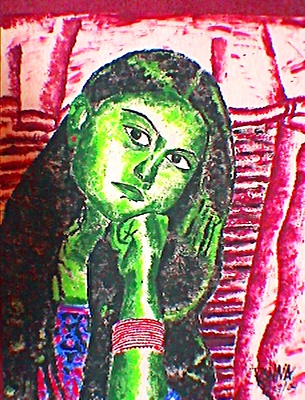All Nonfiction
- Bullying
- Books
- Academic
- Author Interviews
- Celebrity interviews
- College Articles
- College Essays
- Educator of the Year
- Heroes
- Interviews
- Memoir
- Personal Experience
- Sports
- Travel & Culture
All Opinions
- Bullying
- Current Events / Politics
- Discrimination
- Drugs / Alcohol / Smoking
- Entertainment / Celebrities
- Environment
- Love / Relationships
- Movies / Music / TV
- Pop Culture / Trends
- School / College
- Social Issues / Civics
- Spirituality / Religion
- Sports / Hobbies
All Hot Topics
- Bullying
- Community Service
- Environment
- Health
- Letters to the Editor
- Pride & Prejudice
- What Matters
- Back
Summer Guide
- Program Links
- Program Reviews
- Back
College Guide
- College Links
- College Reviews
- College Essays
- College Articles
- Back
Jane Eyre: a fictional heroine of the feminist cause
Charlotte Brontë’s Jane Eyre depicts Jane Eyre as a feminist heroine of the 19th century. At a time when women depended on men financially and socially and considered as propriety only useful for marriage and family life; Jane Eyre acquired total independence and shows throughout her story a new meaning of marriage and value of family to women. Jane Eyre publication Revolutionized literature by encouraging and awakening women to seek social justice and independence from men.
Throughout the novel, Jane constantly receives opposition from men because of her condition as a poor orphan and a female. Rather than to bend to the males laws and the society from which she receives opposition, Jane Eyre defies the chauvinist society and pursuit her own vision of a female life.
In her early childhood in Gateshead Hall, Jane is constantly neglected and abused by Ms.Reed and her children (John, Eliza and Georgiana). Jane was particularly abused by john who made her live in isolation and fear by beating her whenever he wants because Jane was a poor orphan without protection. The weak young girl couldn’t do anything in opposition to john’s violence except to bear the pain physically and emotionally. Offended by reed, Jane feeling of hatred and humiliation went out of control. Jane firmly decided to put an end to “the wicked boy” abuses. For the first time, Jane stood up a fought back when john hit her. Jane riposte to john’s cruelties demonstrate her determination to fight against injustice. Her quarrel and struggle against john creed injustices led her to live in Lowood school where she felt much more content.
During her Jane's education at Lowood School, Jane met Mr. Brocklehurst, a cold, cruel clergyman who runs the institution. Mr. Brocklehurst is a chauvinist who believes in females’s inferiority to men. In his opinion girls should pursuit a modest life, in order to live a righteous life based on subordination to males. He once insulted Jane in front of her classmates by calling her a liar and a “wicked girl” because Ms.Reed told him so. Even humiliated and heartbroken, Jane by her actions showed courage and proved to her classmates and the entire school her integrity and goodness.
After her education in Gateshead, Jane became a governess at Thornfield Manor. A few months after her arrival at Thornfield, Jane met Mr. Edward Rochester an ugly, yet wonderful and passionate and charismatic gentleman nearly twenty years aged than her. Jane falls in love with Edward Rochester who in some instance tried to take advantage of her. Before their intended marriage, Edward offered to Jane a necklace ring and beautiful wedding. Edward intention was to change Jane’s appearance a little bit. Thought at the begin Jane gave in by love for Edward; at the end she refused all of them because she wanted to be the person she is. She wanted to act as the Jane she is and maintain her own personality.
After their unsuccessful attempt to marry in which Edward nearly committed bigamy and kept secret the existence of his wife. Edward asked Jane to accompany him in France where they will live as husband and wife even thought they can not be married. Although she dearly loves Edward, Jane refused Edward’s proposition because she can not abandon her moral and principles by witch she stands by.
Similarly, in her relationship with St. John Rivers, a young clergyman who like Mr. Brocklehurst, believes is a chauvinist. St.john that a woman place in society is to devoted her life to a man. He invited Jane to India to help his work as a wife. Believing that Jane would accept because it is what a good woman will do. Jane strongly declined his offer because she wanted a marriage base on true love and mutual respect.
Jane Eyre defiance of the barriers of gender, Jane Eyre build up the image of a woman who has the courage to fight against gender injustice within the society, and pursuit equality in life and opportunity. She is her own master. She acts freely according to her values and morality. She did not bend to the role attributed to women in the 19th century. She is a feminist in the profound sense of the term.
Finally, the novel Jane Eyre by charlotte Brontë represents a gigantic feminist novel. Jane Eyre is an appropriate heroine of the feminist movement because she embodies the value of feminism which is equal social, sexual, political, intellectual and economic right for both men and women.

Similar Articles
JOIN THE DISCUSSION
This article has 2 comments.
